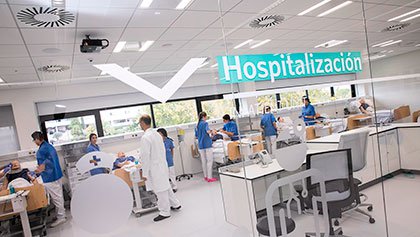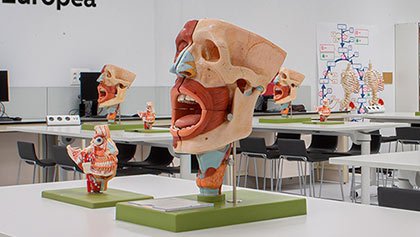-50% Discount on place reservation for 26/27 intake until February 28th!
Bachelor's degree in psychology (BSC Psychology) in Málaga
The Bachelor's Degree in Psychology offers a solid, practical education that will allow you to understand, analyse and improve human behaviour. You'll benefit from learning that focuses on case studies and practical simulations with actors, in facilities equipped with the latest technology in the field of psychology. Here, you'll be able to solve case studies, take part in and follow up on a range of scenarios, allowing you to gain experience in a realistic professional setting.
With a focus on areas such as Clinical, Educational and Organisational Psychology, this degree prepares future psychologists to contribute to social welfare from an ethical and scientific perspective.
Official degree issued by Universidad Europea de Andalucía
| Campus-based | Málaga | 4 years, 240 ECTS | Start: 14 sep. 2026 | School of Biomedical Sciences and Sport |
An innovative university project has arrived in Málaga
Step into a transformative learning environment crafted to help you unlock your full potential and equip you with the tools you need to face the challenges of the future. Our innovative, hands-on approach to education immerses you in real-world learning, where you’ll collaborate with professionals from diverse fields. Here, you’ll gain not only expertise in your profession but also a holistic, future-ready perspective to make a lasting impact.
State-of-the-art facilities
*The images shown are for reference only and may vary from the final result.
A curriculum designed to train psychologists to meet the challenges of today's mental health.
This degree will provide you with a solid grounding in key areas such as behavioural biology, neuroanatomy and cognitive processes. You'll also develop your skills in psychological assessment, therapeutic intervention and understanding human behaviour. During the early years, you'll get a comprehensive overview of the fundamentals of psychology. As you progress, you'll be able to delve deeper into areas of interest to you, such as clinical psychology, forensic psychology or neuropsychology, under the guidance of your professors. In the final year, you'll carry out intensive work placements in professional settings and will prepare your Final Degree Project (TFG), concluding your education with a holistic applied perspective.
Study plan structure
Plan de estudios ofertado en el curso actual
Programa de estudios
PRIMER CURSO
| Materia | ECTS | Tipo | Idioma de impartición |
|---|---|---|---|
| History of psychology | 6 | BA | EN/ES |
| Memory and learning processes | 6 | BA | EN/ES |
| Behavioral biology | 6 | BA | EN/ES |
| Social psychology | 6 | BA | EN/ES |
| Sensation and perception | 6 | BA | EN/ES |
| Motivation and emotion | 6 | BA | EN/ES |
| Physiology | 6 | BA | EN/ES |
| Psychological assessment | 6 | BA | EN/ES |
| Thought and language | 6 | BA | EN/ES |
| Mock rotational practicum | 6 | OB | EN/ES |
SEGUNDO CURSO
| Materia | ECTS | Tipo | Idioma de impartición |
|---|---|---|---|
| Neuroanatomy | 6 | BA | EN/ES |
| Personality and intelligence psychology | 6 | BA | EN/ES |
| Psychological intervention techniques | 6 | OB | EN/ES |
| Communication skills | 6 | OB | EN/ES |
| Assessment in clinical psychology | 6 | OB | EN/ES |
| Developmental psychology | 6 | BA | EN/ES |
| Psychopathology | 6 | OB | EN/ES |
| Simulated clinical stays | 12 | OB | EN/ES |
| Research methods in psychology | 6 | BA | EN/ES |
TERCER CURSO
| Materia | ECTS | Tipo | Idioma de impartición |
|---|---|---|---|
| Psychology of organizations | 6 | OB | EN/ES |
| Statistics applied to psychology | 6 | OB | EN/ES |
| Psychometry | 6 | OB | EN/ES |
| External academic practices I | 12 | PAE | EN/ES |
| Educational psychology | 6 | OB | EN/ES |
| Advanced psychopathology | 6 | OP | EN/ES |
| Neuropsychology | 6 | OP | EN/ES |
| Health psychology | 6 | OP | EN/ES |
| Therapist skills | 6 | OP | EN/ES |
| Introduction to criminology | 6 | OP | EN/ES |
| Psychology of testimony | 6 | OP | EN/ES |
| Penology and penitentiary law | 6 | OP | EN/ES |
| Legal and forensic medicine | 6 | OP | EN/ES |
CUARTO CURSO
| Materia | ECTS | Tipo | Idioma de impartición |
|---|---|---|---|
| Psychology of social and community intervention | 6 | OB | EN/ES |
| Ethical values | 6 | OB | EN/ES |
| University Activities | 6 | OB | EN/ES |
| External academic practices II | 12 | PAE | EN/ES |
| Final degree project | 6 | TFG | EN/ES |
| Psychopharmacology | 6 | OP | EN/ES |
| Psychogeriatrics | 6 | OP | EN/ES |
| Psychological treatment in childhood and adolescence | 6 | OP | EN/ES |
| Psychological treatment in adulthood | 6 | OP | EN/ES |
| Victimology | 6 | OP | EN/ES |
| Criminal psychology | 6 | OP | EN/ES |
| Psychosocial intervention in offenders | 6 | OP | EN/ES |
| Prevention and treatment of delinquency | 6 | OP | EN/ES |
Internships
Universidad Europea de Andalucía is one of the few institutions that offers internships from the first year of the Psychology Degree, recognizing the importance of early practical experience in the comprehensive training of our students. From the beginning, students have the opportunity to apply their knowledge in real professional settings, allowing them to consolidate their skills throughout their education. Throughout the program, students will participate in various internship courses that will provide them with applied skills in different professional environments.
You will be able to complete your internships in hospitals, mental health clinics, rehabilitation centers, schools, penitentiary centers, and private psychology practices. These agreements allow students to develop their competencies in a real professional environment, preparing them for future employment.
Additionally, if you want to enhance your professional experience before completing your university education, you can participate in extracurricular internships.
Career opportunities
Healthcare
- Prevention, assessment, diagnosis and treatment of mental disorders.
- Health promotion and illness prevention.
- Neuropsychological assessment, diagnosis and rehabilitation.
- Mental health programme planning.
- Assessment, planning and intervention in psychosocial rehabilitation programmes.
- Issuing certificates for drivers, possession of weapons, dangerous animals, security guards, etc.
* Training in clinical psychology or as a general health psychologist is required. (Health centres, health services, psychology practices, exam centres, etc.).
Education
- Prevention, diagnosis and treatment of learning difficulties or educational needs.
- Guidance, vocational and professional counselling for students, teachers and family members.
- Educational institutions and psychology practices.
Organisations
- Hiring, training and professional development.
- Analysis of consumer, customer, employee behaviour, etc.
- Market research.
- Occupational health and safety, quality systems and marketing & advertising. (Companies, consultancies, media, etc.).
Forensics and law
- Experts in legal proceedings.
- Specialists in family law.
- Victim support programmes.
- Conflict mediators.
- Psychological management in prisons.
- Intervention with juvenile offenders and crime prevention programmes.
- Psychology corps in the Armed Forces, Civil Guard, National or Autonomous Police.
- Courts, prisons, security forces and corps, Directorate-General for Traffic, insurance companies.
Social and community intervention
- Intervention in communities (social minorities).
- Development cooperation activities (humanitarian aid).
- Development of programmes for entering the labour market and socio-cultural activity.
- Intervention in emergencies and disasters.
- Care services for people with disabilities or disadvantaged people.
- State, regional or local public authorities, national and international non-governmental organisations (NGOs), private bodies linked to public authorities.
Sports
- Emotional management and psychological rehabilitation for athletes.
- Leisure and recreational activity manager.
- Sports, cultural, leisure and recreational organisations.
Teaching and research (Public/private institutions)
- University professor.
- Research staff.
- Intervention in the media.
Admissions
Start your future at Universidad Europea
You can become a student at Universidad Europea in three easy steps.
1
Admission exams
Start your admission process by calling +34 952006801 or request information and our advisors will contact you.
2
Place reservation
Once you have been admitted, secure your place by paying the reservation fee.
3
Enrollment
Submit the required documents to formalise your enrollment.
Scholarships and financial aid
We want to help you. If you want to study at Universidad Europea, you will have at your disposal a wide selection of own and official scholarships.
Credit recognition and transfers
You don’t have to stick with something you don’t like. That’s why we’ve designed specific plans for credit recognition and transfers.
Request your online credit recognition review, transfer your academic file and start studying at Universidad Europea.
Admission profile and entry requirements
The ideal profile for the Bachelor's Degree in Psychology includes people who are genuinely passionate about understanding and improving the emotional and mental wellbeing of others, who also have a deep interest in psychological processes and human behaviour. These students stand out for their interpersonal skills and their ability to listen and empathise, which are key qualities for interacting effectively with a wide range of people. They also have an analytical approach that allows them to assess and address a range of issues, as well as a strong willingness to learn and adapt to developments in psychological research and techniques.
Faculty
The faculty of the Psychology Degree at the Universidad Europea de Andalucía is composed of a highly qualified teaching team, whose experience and training ensure an excellent education in the field of psychology. Our professors include doctors and experts in various areas of psychology, enriching the academic and professional experience of our students.
The faculty is committed to the comprehensive training of students, providing an education that not only covers the theoretical foundations of psychology but also emphasizes practical application and the development of interpersonal skills. Thanks to the diversity of specializations among the teaching staff, students have the opportunity to learn from experts in areas such as clinical psychology, educational psychology, social psychology, and psychobiology, among others.
Additionally, all our instructors are accredited with a C1 language level, ensuring high-quality teaching in both Spanish and English, which facilitates access to an international education and prepares students for a globalized work environment.
Frequently Asked Questions
What can do you do with a bachelors in psychology?
Psychology is a profession with different branches of specialisation and fields of work, as well as with several career opportunities in fields as diverse as healthcare, business, education, and research. A licensed/ graduate Psychologist, enrolled in an official order of Psychologists, can practice within different areas. Among them, clinical, educational, organisational, social and community, legal and forensic, physical activity and sports, teaching and research.
Depending on the country in which you expect to develop your professional practice, you may find specific regulatory regimes (e.g., tasks and activities and/or regulated titles, like is the case of clinical and health psychology in Spain).
How many years does it take to get a degree in psychology?
The degree in Psychology is usually a four-year program with different plans of studies depending on the university to which it belongs. Those who want to work in applied settings such as psychological therapy will generally need to complete a graduate program and get a master's degree in psychology. A master's degree in psychology typically takes two to three years to complete and may require an additional 2-3 years of supervised experience or internship before they can get licensed. Doctoral degrees in psychology, highly specialised and research oriented, can take an additional four to seven years to complete beyond a master’s degree. These time estimates are general and may vary depending on the specific program, institution, and its location.
Where can I study psychology degree?
You can study a psychology degree at colleges and universities, in both public and private universities. You can also study a psychology degree online from a few universities and colleges, which can be a great option if you are unable to attend on-campus classes or prefer online learning.
What subjects do you need for psychology?
The specific subjects required for a psychology degree can vary depending on the program and institution, but most programs will require a core set of classes in the field of psychology. Here are some examples of subjects you might take as part of a psychology degree: Introduction to Psychology, Research Methods, Statistics, Developmental Psychology, Social Psychology and Abnormal Psychology. In sum, there is a broad range of subjects you need to take for psychology degree, and you will likely have a lot of flexibility to tailor your education to your interests.





